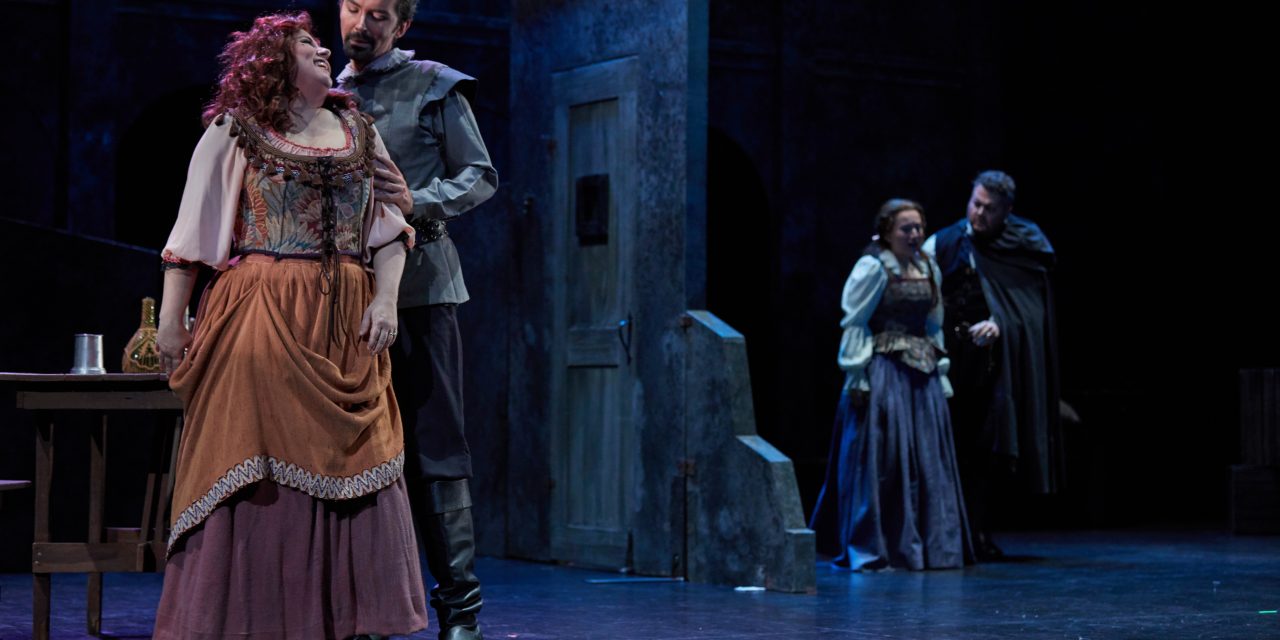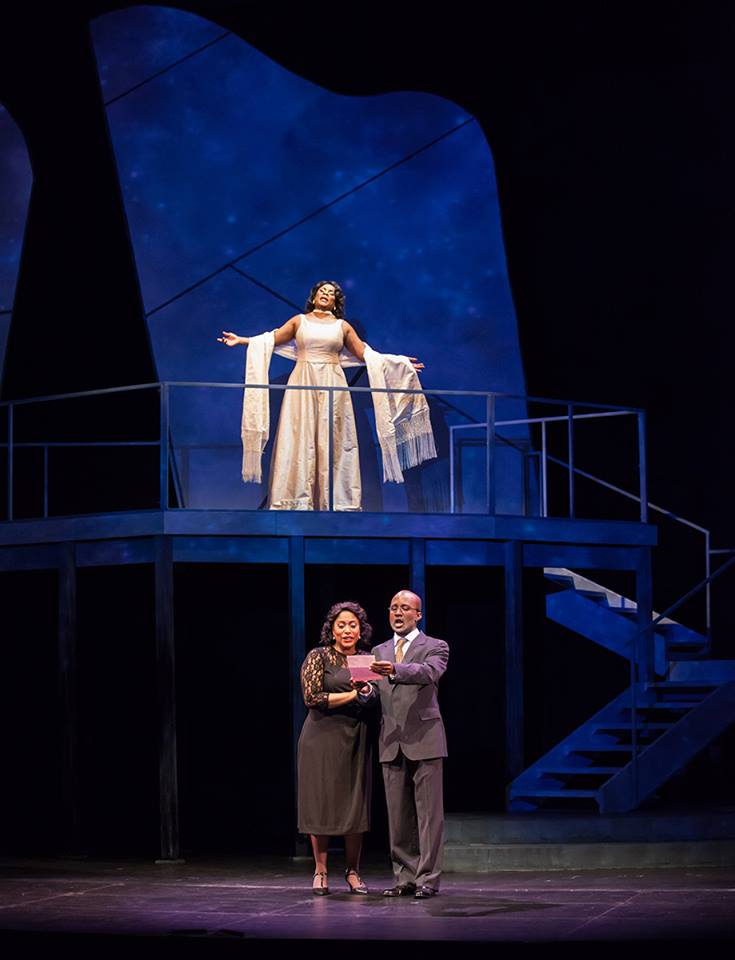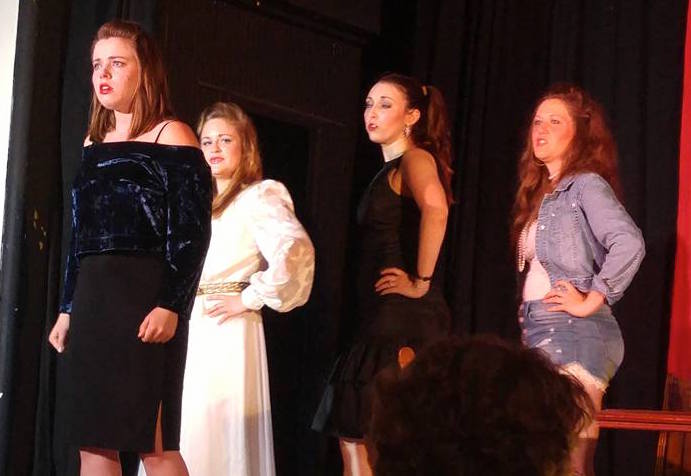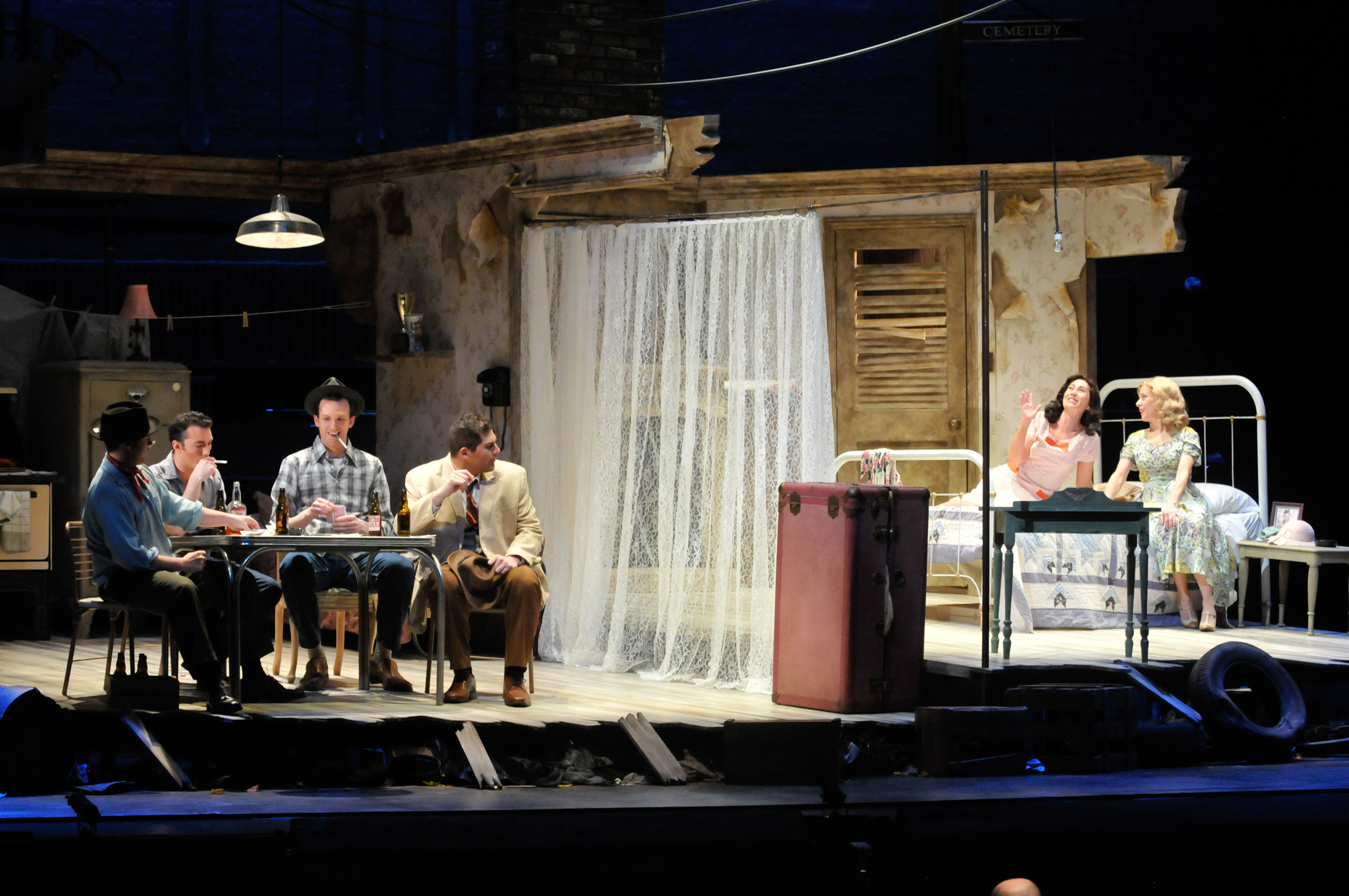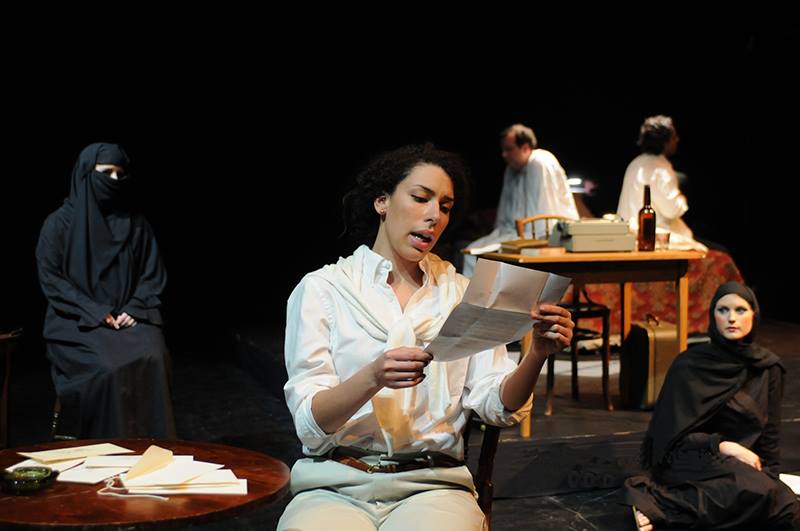Elizabeth Batton, John Irvin, Mané Galoyan, & Anthony Clark Evans. Photo: KY Opera
Rigoletto
Composed by Giuseppe Verdi
Libretto by Francesco Maria Piave
Directed by Kathleen Belcher
Conducted by Roberto Kalb
Reviewed by Annette Skaggs
Entire contents are copyright © 2019 Annette Skaggs. All rights reserved.
Who doesn’t like a little scandal with their opera, huh? While Verdi considered the works of Shakespeare a great influence, upon the hearing of Victor Hugo’s racy poem Le Roi s’amuse he knew he had to set it to music. The poem was banned as soon as it premiered because of its accusations of the behavior of the French court, but after time Hugo was able to defend himself successfully. Then Verdi got to work with his favored librettist Francesco Maria Piave to convince the censors to allow him to use the poem. In time they agreed that if he would change the names and places within the poem, he could use it. Despite being a huge success, critics still tried to discredit Rigoletto.
160 or so years later Rigoletto is still going strong, even if by now the scenario is no more scandalous as the average daytime soap opera. But it remains a juicy and watchable story, not to mention it was during the writing of this opera that Verdi was moving into some of his most fertile creative moments.
The Duke of Mantua (John Irvin) is a cad. It is not uncommon for the Duke to prey on women, young or old, single or married. His lust always wins over, not thinking of those that his actions may hurt. Of course, he surrounds himself with Courtiers that would assist him in his conquests. Among his court is his jester, Rigoletto (Anthony Clark Evans), who persuades the Duke to seduce the Countess Ceprano (Natasha Lynn Foley). Not being one to shy away from a challenge the Duke does exactly that. Having learned of this, Count Ceprano (Caleb Ashby) exacts revenge on Rigoletto, exclaiming to his fellow Courtiers that he will steal away Rigoletto’s mistress. As the Court is enjoying life’s pleasures, Count Monterone (Michael Preacely) arrives and accuses the Duke of seducing his daughter. The Duke has Monterone arrested and set for execution. On the walk to his death, Monterone curses the Duke and Rigoletto.
Rigoletto is deeply concerned about the curse and runs into the local assassin Sparafucile (David Leigh), who offers his services to him. Rigoletto defers but tells the murderer that there could be a time in the near future. He is delighted to find his daughter Gilda (Mané Galoyan) waiting when he returns home. Rigoletto is an over-protective father, only allowing her outside of the house to attend church accompanied by her nurse Giovanna (Katherine Calcamuggio Donner). As an inquisitive child would do, Gilda tries to persuade her father to share more about her late mother and about her father. Rigoletto stays tight-lipped because of his love for her.
A young man lurking around Rigoletto’s house proclaims his love to Gilda, stating that he is a poor student when in fact he is the Duke. Gilda further professes her love for him. Upon his departure, the Courtiers kidnap Gilda and take her to the Palace for the Duke’s enjoyment.
When Rigoletto returns to Court, he begs for Gilda’s return, revealing that she is his daughter. Escaping from the Duke’s chambers Gilda reveals to her father what has happened. Rigoletto then sets his revenge in motion.
It has been a long 19 years since the Kentucky Opera has produced Rigoletto – far too long to wait for one of Verdi’s best operas. That’s not to say that it is without faults, especially in the libretto, but its music is stunning…. when performed with passion and warmth.
All in all, this cast did a fantastic job all around but some musical points vexed me a bit. While the role of Giovanna is quite small, the usual powerhouse voice that is Ms. Donner seemed stifled. Perhaps Ms. Donner was not in her full voice, but I was disappointed to not hear her in a bigger presence. Another sticking point for me was in John Irvin’s delivery as The Duke. While his voice is actually quite nice and has a great timbre to it, I couldn’t help but wonder what he would have sounded like if he would have opened his mouth up just a little bit more. I am not sure if his vocal delivery is like that, but there were times that he seemed tensed up. However, the famous aria “La donna e mobile” was rather good, especially from the wings. The Kentucky Opera chorus did well, but there were times that it was difficult to hear them over the orchestra, especially as the notes got a little deeper. And despite some aggressive cymbal playing in the first act, our Louisville Orchestra under the baton of conductor Roberto Kalb was right on the money.
On the flip side, the role of Maddalena, Sparafucile’s sister, performed by Elizabeth Batton, while smaller as far as musical content, was pitch perfect in its delivery. And speaking of Sparafucile, from his presence and demeanor on stage to his bellowing of a low F that was sustained and heard quite audibly as he walked off the set, all I can say about David Leigh’s delivery is…WOW.
Thomas Capobianco as Borsa and Caleb Ashby’s Count Ceprano were delightful, but Adrian Sanchez’s Marullo was brilliant. One of the surprises of the evening was Michael Preacely. He too has a deep and velvety bass line that I am hoping to hear more of in the near future.
You have to applaud a vocalist who can come out and do a cartwheel and go right into singing some difficult music. Such was the audience’s delight in having Anthony Clark Evans’ talent and his depiction of Rigoletto. While it took a little while for his voice to gain some footing, he was quite strong and captured every nuance of the wretched Rigoletto’s life: past, present, and future. He was tender and reviled when he needed to be.
Soprano Mané Galoyan put me in mind of the old saying, “Good things come in small packages” Her portrayal of Gilda had me believing that she was a young, naïve girl in love. But beyond that, she has got a voice that makes you take notice. Ms. Galoyan was at her best when she approached some of the higher notes, giving herself the time and attention that was needed to deliver. She was also quite comfortable in the lower register. I can certainly see her star rising.
The elephant in the room pertains to the set design. While the upstage set looked lovely, with a wall broken up by arched openings and staircase that was quite fitting for the change of scenes whether it was the Palace, or Rigoletto’s house or Sparafucile’s tavern, there was a doorway that was right in the middle of the stage. Now had the doorway not had a door on it, it may have been fine, but the door divided the audience into two sightlines. If you were in the audience on stage right you missed most of everything going on in the last scene if you were stage left, you missed action going on inside of the houses throughout the performance. If the blocking could have been brought downstage more, past the doorway, then we all would have had a better chance of seeing crucial moments within the opera.
Another sticking point for me was moments of “Park and Bark”. If you are not familiar with the term, it means that a singer pretty much just stands in one place (sometimes there is a little movement) and sings. I noticed this more in the performances of Gilda and The Duke. For instance, rather than The Duke just sit at a table and hold a beer stein in his hand singing “La donna e mobile”, some swagger might have been more fun and underscored his womanizing. Some audiences don’t mind the stand and sing, but I like a little movement.
Costuming and wigs were appropriate for the time, but there was a moment that Rigoletto’s deformity was not very noticeable. Upon his next entrance, it looked better.
Overall, this production of Rigoletto had me entertained throughout. I very much enjoyed listening to some new voices and revisiting ones I’ve heard for a number of years now.
I believe Verdi certainly gets the last laugh as it pertains to all of the censors that he had to deal with a century and a half ago…. you can’t stop the people’s desire to witness, hear, and breath great opera. Such is the case of Rigoletto.
Bravi Tutti!!
Rigoletto
Friday, February 16, 2019 at 8 pm
Sunday, February 18, 2019 at 2 pm
Kentucky Opera
W.L. Lyons Brown Theatre
315 West Broadway
Louisville, KY 40202
502-584-7777
kyopera.org
![]() Annette Skaggs is heavily involved as an Arts Advocate here in Louisville. She is a freelance professional opera singer who has performed throughout Europe and in St. Louis, Cincinnati, Boulder, Little Rock, Peoria, Chicago, New York and of course Louisville. Aside from her singing career, she has been a production assistant for Kentucky Opera, New York City Opera, and Northwestern University. Her knowledge and expertise have developed over the course of 25+ years’ experience in the classical arts.
Annette Skaggs is heavily involved as an Arts Advocate here in Louisville. She is a freelance professional opera singer who has performed throughout Europe and in St. Louis, Cincinnati, Boulder, Little Rock, Peoria, Chicago, New York and of course Louisville. Aside from her singing career, she has been a production assistant for Kentucky Opera, New York City Opera, and Northwestern University. Her knowledge and expertise have developed over the course of 25+ years’ experience in the classical arts.
2019 Arts-Louisville/Broadway World Theatre Award Sponsorship provided by



